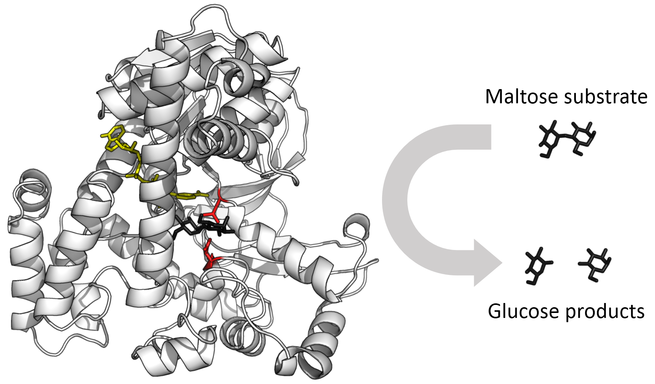
Main Difference
The main difference between Enzyme and Catalyst is that the Enzyme is a class of biological molecules with catalytic activity and Catalyst is a substance that increases chemical reaction speed, and which is conserved after the reaction
-
Enzyme
Enzymes are proteins that act as biological catalysts (biocatalysts). Catalysts accelerate chemical reactions. The molecules upon which enzymes may act are called substrates, and the enzyme converts the substrates into different molecules known as products. Almost all metabolic processes in the cell need enzyme catalysis in order to occur at rates fast enough to sustain life. Metabolic pathways depend upon enzymes to catalyze individual steps. The study of enzymes is called enzymology and a new field of pseudoenzyme analysis has recently grown up, recognising that during evolution, some enzymes have lost the ability to carry out biological catalysis, which is often reflected in their amino acid sequences and unusual ‘pseudocatalytic’ properties.Enzymes are known to catalyze more than 5,000 biochemical reaction types. Other biocatalysts are catalytic RNA molecules, called ribozymes. Enzymes’ specificity comes from their unique three-dimensional structures.
Like all catalysts, enzymes increase the reaction rate by lowering its activation energy. Some enzymes can make their conversion of substrate to product occur many millions of times faster. An extreme example is orotidine 5′-phosphate decarboxylase, which allows a reaction that would otherwise take millions of years to occur in milliseconds. Chemically, enzymes are like any catalyst and are not consumed in chemical reactions, nor do they alter the equilibrium of a reaction. Enzymes differ from most other catalysts by being much more specific. Enzyme activity can be affected by other molecules: inhibitors are molecules that decrease enzyme activity, and activators are molecules that increase activity. Many therapeutic drugs and poisons are enzyme inhibitors. An enzyme’s activity decreases markedly outside its optimal temperature and pH, and many enzymes are (permanently) denatured when exposed to excessive heat, losing their structure and catalytic properties.
Some enzymes are used commercially, for example, in the synthesis of antibiotics. Some household products use enzymes to speed up chemical reactions: enzymes in biological washing powders break down protein, starch or fat stains on clothes, and enzymes in meat tenderizer break down proteins into smaller molecules, making the meat easier to chew.
-
Enzyme (noun)
A globular catalyses a biological chemical reaction.
-
Enzyme (noun)
leavened bread, as opposed to azyme
-
Catalyst (noun)
A substance that increases the rate of a chemical reaction without being consumed in the process.
-
Catalyst (noun)
Someone or something that encourages progress or change.
“Economic development and integration are working as a catalyst for peace.”
-
Catalyst (noun)
An inciting incident that sets the successive conflict into motion.
-
Catalyst (noun)
A catalytic converter.
-
Catalyst (noun)
a substance that increases the rate of a chemical reaction without itself undergoing any permanent chemical change
“chlorine acts as a catalyst promoting the breakdown of ozone”
-
Catalyst (noun)
a person or thing that precipitates an event
“the prime minister’s speech acted as a catalyst for debate”
